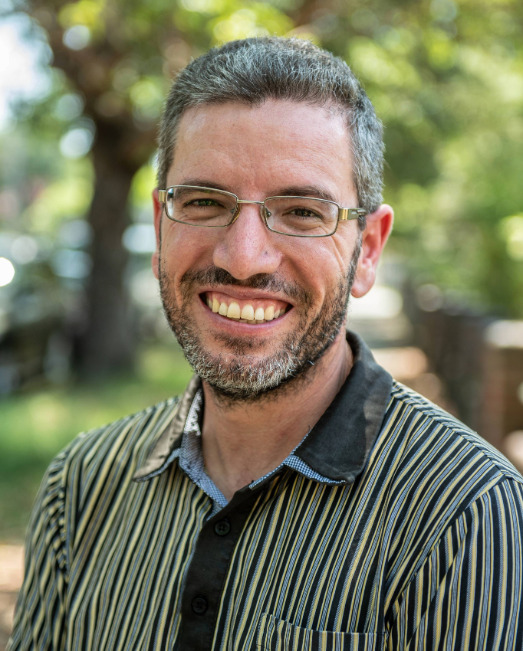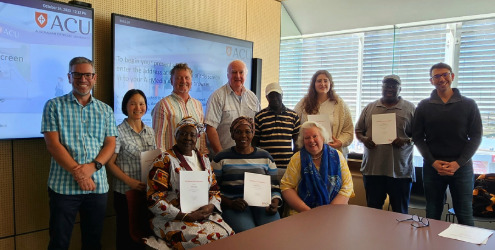Community
Copyright@ Australian Catholic University 1998-2026 | ABN 15 050 192 660 CRICOS registered provider: 00004G | PRV12008
Copyright@ Australian Catholic University 1998-2026 | ABN 15 050 192 660 CRICOS registered provider: 00004G | PRV12008

They come from all sorts of backgrounds: Childhood trauma survivors, migrants from war-torn nations, disadvantaged kids who never finished high school, women escaping domestic violence. As a lecturer at Australian Catholic University (ACU) and the Blacktown-based coordinator of Clemente Australia, a unique program that provides marginalised Australians with a pathway to university study, Youssef Taouk comes into contact with these characters on a regular basis.
Lest it be thought that they’re a tough crowd to teach, often they’re more engaged than students in a conventional university classroom.
“These people are there because they’re hungry for education,” says Dr Taouk, who was instrumental in setting up a new Clemente site in Blacktown in early 2020. “They immerse themselves in the lectures and the lessons, and that often makes the classroom a more vibrant place, where students are willing to engage, ask questions and share their experiences with the content being taught.”
Although ACU has long been the sponsor and host of Clemente in Australia, its origins lie in the United States.
Almost 30 years ago, the Clemente Course in the Humanities graduated its first class in New York City. The program’s founder, an author and social critic named Earl Shorris, believed that studying the arts and humanities could give adults facing adverse circumstances a chance at a better life. While the prevailing view was that people who experience disadvantage needed practical vocational skills, Shorris’s idea was to teach the type of critical thinking one gains by engaging with the humanities – literature, history, and the work of philosophers like Aristotle and Kant.
“If the multigenerational poor are to make the leap out of poverty, it will require a new kind of thinking – reflection,” Shorris wrote in 1997. “And that is a beginning. The study of the humanities is in itself a redistribution of wealth. People who know the humanities become good citizens, become active, not acted upon.”
“That captures it beautifully,” says Dr Taouk, “because once people gain intellectual know-how and capacity, suddenly they have a choice. Many wouldn’t have dared to contemplate going to university before they did Clemente, because they have this idea that higher education is not for them. Once they learn to operate in that system, they realise that university isn’t just for the rich or the highly intelligent – anybody can go to university. It empowers them with a choice they never had.”
The success of the first-ever Clemente class in New York was a case in point. Within a year, 10 of the first 16 graduates were attending university or going to nursing school, while the remainder attended community college or worked full-time.
Clemente Australia has also had its fair share of success stories since its inception in 2003.
Take Mathoc Gab, the South Sudanese migrant who, after completing the Clemente course in Blacktown, enrolled into university as he approached his 50th year. Or Tabitha Drew, who survived poverty and violence and went on to pursue a bachelor’s degree, and says Clemente “really plucked me out of a deep hole”. Or what about John Foster, the former circus clown and amateur poet who had hardly stepped foot into a classroom in all his 60-odd years, and says the program left him “ready to take on any challenge”.

Youssef (left) with some of his Clemente students.
Pursuing further study is a common path for Clemente graduates, one that’s made smoother by the fact that the four units studied through the course can be credited towards an ACU undergraduate degree. But Dr Taouk says it’s not the only form of success you can get from the program.
“I know a former student named Nigel who works in a warehouse, and in his spare time he makes these short documentaries because he always wanted to be a filmmaker, but it wasn’t until Clemente that he developed the skills and confidence to go about it,” he says.
“I’ve watched some of these documentaries and they’re really powerful, and they give Nigel a sense of purpose. For me, that’s a huge success story.”
Dr Taouk shares a succinct and yet erudite quote from one of the films, in which Nigel says: “Clemente teaches people to think. What’s wrong with wanting to think?”
“That’s how he summed it up,” Dr Taouk says with a smile. “I think there’s some wisdom in that. The liberal arts enable people to reflect upon themselves and the society that they live in, and when you reflect on these things, you start to learn more about yourself and your surroundings. That encourages more thinking, deeper thinking, and once you learn to think and make thinking a habit, it’s the most powerful tool you can have.”
It would be fair to say that Youssef Taouk is more comfortable talking about his students than himself. And yet, his own journey is no less interesting.
Long before his current role as a recruiter and teacher of Clemente participants, Dr Taouk was a student at ACU. Having completed his PhD, an exploration of the Roman Catholic Church in Britain during the First World War, he returned to study to obtain a teaching qualification.
“I was a sessional lecturer at another university, and because I couldn’t find full-time work, I thought that maybe the best difference I could make was to become a schoolteacher,” he recalls.
While studying in the course, Dr Taouk met Professor Brother Jude Butcher, who recruited him to join ACU’s now disestablished Institute for Advancing Community Engagement, a research centre aimed at facilitating university-community partnerships in Australia and internationally.
This role took Dr Taouk to Timor-Leste, where among other things he explored the effectiveness of ACU’s partnership with the Catholic Teachers’ College in Baucau, co-authoring a book on the topic. As part of his work for the institute, he visited various other countries including Cambodia and Thailand, and helped to set up community engagement programs in South Africa and the United States.
Dr Taouk says he was intrigued by the features of effective community engagement programs and the contributions they could make to the populations they aim to benefit.
Among his many research projects was an ARC-funded study exploring social inclusion through the Clemente course. The research found that the program enhanced transformational learning opportunities among those facing adverse circumstances, while also aiding social interaction and community participation.
“Our major finding was that Clemente boosts a student’s confidence and self-esteem dramatically,” says Dr Taouk, who co-authored the study with Associate Professor Peter Howard, Professor Butcher and other researchers.
“Participants would come out of the course not only with new knowledge, but also feeling more confident, more able to connect with peers and create friendships, and in some cases, they even reconnected with family members they hadn’t seen or spoken to in years. It showed that the benefits of Clemente are multi-fold and immense.”
Away from his work with Clemente Australia, Dr Taouk is incredibly active in his own community, volunteering for several organisations and committees among the sizeable Lebanese Maronite Catholic population of Sydney.
In 2019, he was awarded a Medal in the Order of Australia (OAM) for service to the Lebanese community, an honour that left him “a bit shocked and taken aback” by the media exposure that ensued.
“Nobody who volunteers or who’s involved in the community does it for attention or accolades, so it was definitely a surprise,” he says. “At first, I was embarrassed and thought, ‘Why would they give this to someone like me?’”
Dr Taouk is undoubtedly more at ease when the spotlight is on his students, their successes as they go through the Clemente course and on to bigger and better things. He says that being involved with Clemente is “extremely fulfilling work”.
“You concretely see that you’re making a difference to people’s lives,” he says.
“I’m lucky that I get paid to do this, because it’s something that I would do – and please don’t share this with my boss – but I would do this even if I wasn’t getting paid. What’s more fulfilling than helping people to transform their lives?”
ACU has partnered with various community organisations to deliver Clemente in Sydney, Canberra, Brisbane, Melbourne and Ballarat. Find out if Clemente is for you.
Copyright@ Australian Catholic University 1998-2026 | ABN 15 050 192 660 CRICOS registered provider: 00004G | PRV12008